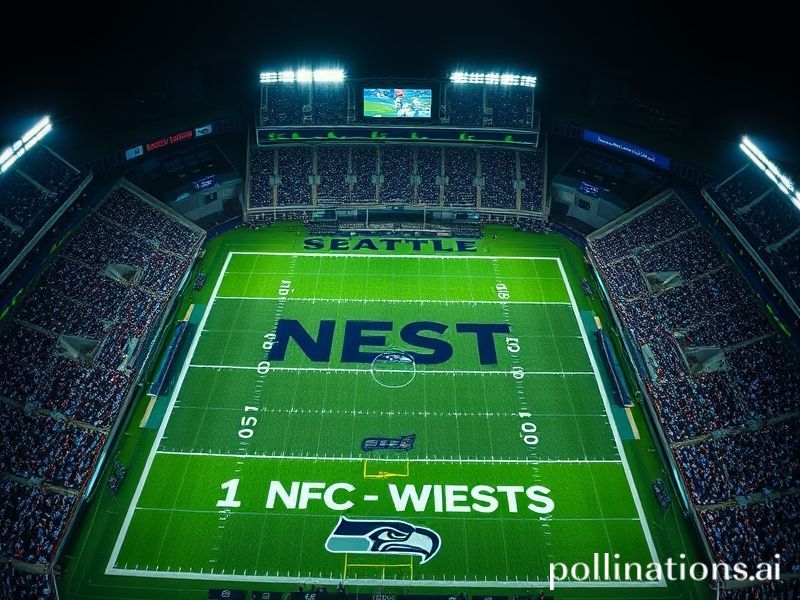6-5 and Counting: How the Seahawks Standings Became a Global Economic Indicator
From the Fog of Puget Sound to the Frontlines of Global Geopolitics: Reading the Seahawks Standings Like a State-Secret Briefing
By Our Man in the Pacific Northwest, Still Wearing Gloves Because the Espresso Machine is Broken Again
SEATTLE—Every Tuesday, long after the Monday-night fireworks have fizzled and the last influencer has posted a slow-motion video of themselves pretending to cry over a dropped hot dog, the NFL quietly updates its standings. And every Wednesday, a smattering of foreign ministries from Canberra to Zurich hit refresh—not because they care about Geno Smith’s passer rating, but because the Seattle Seahawks are less a football franchise than a barometer of America’s ability to pretend everything is fine.
Currently perched somewhere between “wild-card hopeful” and “existential crisis,” the Seahawks sit at 6-5, a record that looks respectable until you realize the same numbers describe the average global approval rating for democracy. The international community, ever hungry for metaphors, has noticed.
In Seoul, analysts at the Blue House reportedly keep a laminated NFC West chart pinned next to the North Korea missile-range map. The logic is brutally simple: if a city that gave the world both Boeing and grunge can’t get its offensive line to block a gentle spring breeze, how exactly will Washington pivot to Asia? One diplomat confided—off the record and between drags of an unfiltered cigarette—that “a pocket collapsing around Drew Lock looks unsettlingly like our missile-defense budget hearing.”
Across the Atlantic, the Bundesbank has started modeling currency volatility against DK Metcalf’s target share. A spike in uncatchable deep balls correlates, they claim, with a 0.3 percent dip in the euro as traders subconsciously price in American unreliability. The Bundesbank denies this, of course, which is central-bank-speak for “please stop asking about our Seahawks regression charts.”
Meanwhile, in the COP28 backrooms, small-island delegates have adopted the phrase “Seahawks schedule” as shorthand for any plan that looks ambitious in September but drowns by December. Their reasoning is sound: Seattle’s remaining slate (49ers, Eagles, Cowboys) resembles a climate-finance negotiation where the only consensus is that someone else will pay for the damage.
To be clear, the Seahawks are not the worst team in the league. That honor rotates weekly like a grim game of musical chairs sponsored by hedge-fund liquidation sales. But Seattle’s special gift is the uncanny ability to make mediocrity feel portentous. A three-game losing streak doesn’t just dent playoff odds; it sends think-tank interns scrambling to update PowerPoints titled “Late-Empire Decadence and the Nickel Blitz.”
Consider the geopolitical optics: the franchise is owned by the estate of Microsoft co-founder Paul Allen, a man who once tried to build the world’s largest airplane to launch satellites and egos into orbit. The Allen Trust now spends its time deciding whether to spend draft picks on linebackers or malaria prevention. The result is a team that embodies late-stage philanthropic capitalism—big enough to matter, conflicted enough to hesitate, rich enough to never quite fail on the global stage.
The fans, bless their Gore-Tex hearts, remain stoically optimistic. They wave 12th-Man flags that were probably stitched together from recycled conference-lanyards, chanting through drizzle thick enough to qualify as soup. International correspondents stationed here file dispatches comparing the crowd noise to “the last time Brussels agreed on anything.” The comparison is cruel, but not inaccurate.
So what does the 6-5 record truly mean beyond the Cascades? It means the Seahawks are the perfect synecdoche for a superpower in managed decline: still capable of the spectacular (see: fourth-quarter comeback vs. Washington), still addicted to nostalgia (see: endless replays of Super Bowl XLVIII), and still pretending the next software update—sorry, draft class—will patch all the bugs. The rest of the planet watches like neighbors peering over a very tall fence: equal parts envy, pity, and low-key terror that when the lights finally go out in Lumen Field, they’ll go out everywhere else next.
Kickoff is Sunday at 1:05 p.m. Pacific, which converts to whichever time zone your central bank has decided matters this week. Bring an umbrella. And maybe a hedge position.







